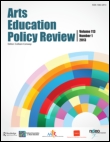tandfonline.com har udgivet en rapport under søgningen „Teacher Education Mathematics‟: ABSTRACT ABSTRACT As a result of international neoliberal and neoconservative trends, the status of the arts has been devalued in secondary school curricula. This paper examines why the arts are not considered core educational knowledge in pedagogic discourse arising from the New Right policy agenda. In a case study analysis of Swedish educational policy debates, curriculum codes and their underlying principles of recontextualization are weighed as they bear on the arts. Discursive positionings and socio-political networking between political standpoints and stakeholders have been analysed based on official Swedish documents associated with the legislative process of curriculum revision. Our findings show how justifications of arts education clash with coding orientations arising from a strong classification between what is presumed to be… Continue Reading →
Like this:
Like Loading...
tandfonline.com har udgivet en rapport under søgningen „Teacher Education Mathematics‟: ABSTRACT ABSTRACT Background: There is a growing view that ‘Big Ideas of science education’ are useful for teaching science but there is not much knowledge of how teachers work with them. Purpose: This study explores the conceptualisation and practice of the use of Big Ideas of science education by primary and secondary teachers in Chile. Sample: A total of 63 science teachers (a purposive sample) from pre-school, primary and secondary education in Valparaíso Region in Chile participated in the study, with 38 of them answering all the questions in the research instrument and 25 answering some of them. Design and methods: The research instrument was a questionnaire with open-ended questions. Results: The use of Big Ideas was seen as the… Continue Reading →
Like this:
Like Loading...
tandfonline.com har udgivet en rapport under søgningen „Teacher Education Mathematics‟: Abstract Abstract This paper explores the declining trend of fine arts education in secondary schools. We examine mechanisms that may explain this phenomenon on structural levels of policymaking and policy implementation in different areas of the education system. What will be defined as the “selection device” refers to the structurally determined selection of educational content at various policy levels of society. We argue that the choices politicians, principals, students, and parents make are regulated by “nudging” as an underlying principle of the selective device. By presenting students with “rational choice” alternatives, they are gently pressuring them away from selecting arts courses. This redirection is discursively conveyed by schools, but systematically governed by national and international guidelines in which the fine… Continue Reading →
Like this:
Like Loading...


